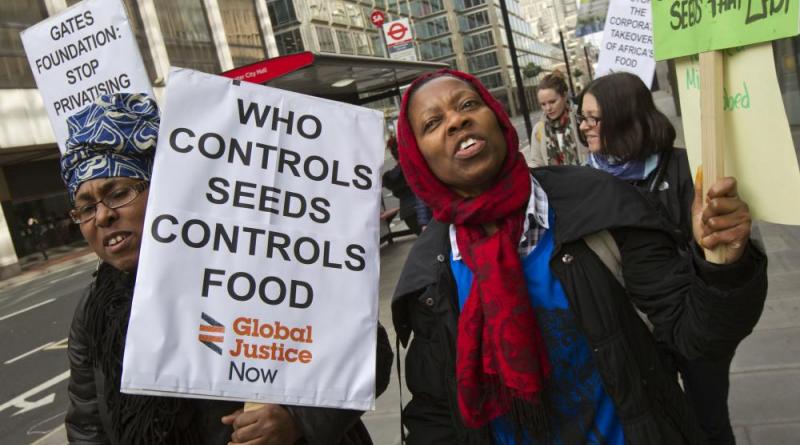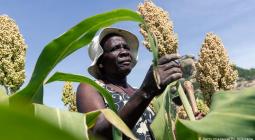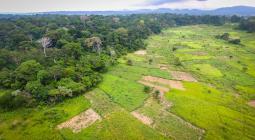Gates 'failing green revolution in Africa'.

Green revolution is locking African farmers into a system that is not designed for their benefit, but for Northern multinational corporations.
Billions of dollars spent promoting and subsidising commercial seeds and agrichemicals across Africa have failed to fulfill their promises to alleviate hunger and lift small-scale farmers out of poverty, according to a new white paper published by the Tufts University Global Development and Environment Institute.
African and German civil society organisations produced a report based on the research, “False Promises,” calling on governments to stop funding and subsidising the so-called “green revolution” and shift support to programs that help small-scale food producers, particularly women and youth, develop climate-resilient ecologically sustainable farming practices.
The research examines the Alliance for a Green Revolution in Africa (AGRA), a nonprofit launched by the Bill & Melinda Gates and Rockefeller foundations in 2006 with promises to double yields and incomes for 30 million farming households while cutting food insecurity in half in 20 African countries by 2020.
Failures
The effort has fallen far short of those goals, according to the new research led by Timothy A. Wise, former director of the Tufts GDEI program and now a senior advisor at the Institute for Agriculture and Trade Policy.
In 14 years, AGRA has collected nearly a billion dollars in donations and disbursed $524 million, primarily in thirteen African countries, promoting the use of commercial seeds, chemical fertilisers and pesticides – a technology package further supported by about $1 billion per year in subsidies from African national governments.
According to the Gates Foundation, AGRA’s largest funder, these investments are “the surest path to reducing poverty and hunger in Africa.” But AGRA has provided no evaluation or comprehensive reporting to support that claim. To evaluate progress, the Tufts researchers relied on national-level data for agricultural productivity, poverty, hunger and malnutrition.
The researchers found "little evidence of widespread progress on any of AGRA’s goals, which is striking given the high levels of government subsidies for technology adoption." The paper documents slow productivity growth, no significant increases in food security or small-farmer incomes, and worsening hunger in most of AGRA’s target countries.
Wise said: “It’s a failing model, failing results; it’s time to change course."
Evaluation
AGRA disagreed with the analysis, claiming in a statement that the research failed to meet “basic academic and professional standards of peer review and asking the subject to comment on the ‘findings.’” AGRA accused Wise of having “a history of writing unfounded allegations and uncorroborated reports about AGRA and its work.”
In an email, Andrew Cox, chief of staff and strategy at AGRA, criticised the researcher as “not professional and ethical” and said they “prefer to have transparency and engagement with reporters and others directly around the issues.” He said that AGRA “will do a full evaluation against its targets and results” at the end of 2021.
Wise, whose 2019 book Eating Tomorrow was critical of aid that pushes high-input agricultural models in Africa, said he contacted AGRA repeatedly with requests for their monitoring and evaluation data. The organization said it would provide the information but ceased responding to requests. Wise said: “If AGRA or the Gates Foundation has data that contradicts these findings, they should make them available."
The Gates Foundation responded to the Tufts paper with a statement from its media team: “We support organisations like AGRA because they partner with countries to help them implement the priorities and policies contained in their national agricultural development strategies.
"We also support AGRA’s efforts to monitor progress continually and collect data to inform what’s working and what’s not working. We encourage you to look to AGRA’s newly released annual report for the latest data on its goals and impact. “
Hunger
The Tufts paper concluded: “The evidence suggests that AGRA is failing on its own terms. Its model of high-input agriculture is failing to reach large numbers of smallholder farmers. When it does reach farmers it is failing to significantly increase their productivity, and incomes are not increasing in a way that would reduce poverty and food insecurity.”
Among the key findings of the Tufts paper was that the number of hungry people in AGRA’s thirteen focus countries has jumped thirty percent during the AGRA years, despite the massive investments in agricultural productivity gains.
Productivity increased just 29 percent over twelve years for maize, the most subsidised and supported crop – far short of the goal of a 100% increase. Many climate-resilient, nutritious crops have been displaced by the expansion in supported crops such as maize.
Even where maize production has increased, incomes and food security have scarcely improved for AGRA’s supposed beneficiaries: small-scale farming households.
Although AGRA’s programs have long been pitched as an effort to boost the incomes of small farmers and a key focus of the Gates Foundation is advancing the economic power of women, researchers found no evidence AGRA is reaching a significant number of smallholder farmers or women. While some medium-sized farms may see productivity improvements, “those are overwhelmingly farmers – mostly men – with access to land, resources, and markets,” the report said.
Devastating
Jan Urhahn, agricultural expert at the Rosa Luxemburg Stiftung, which funded the research, said: "The results of the study are devastating for AGRA and the prophets of the Green Revolution."
He added: "We are interested in having an evidence-based debate with policy makers about the approach taken by AGRA. We see no reason to focus, as AGRA does, on individuals and 'personalize’ the arguments. With our study we have taken a very comprehensive and holistic approach and, in addition to data analysis, have carried out country research and spoken to small-scale food producers among others. The results confirmed all our doubts."
Muketoi Wamunyima, country coordinator for PELUM Zambia, said the findings bolster his group’s longstanding “fears and apprehension about AGRA in Africa.” He said AGRA is not an African organization, although it presents itself as such.
Wamunyima said: “As civil society organizations working in Zambia, we have challenged AGRA’s model and engaged with our local government to highlight the fact that AGRA’s approach does not respond to the needs of the small-scale food producers."
Small scale food producers are increasingly going into poverty while adopting AGRA solutions such as the Farmer Input Support Program. AGRA should have responded to the study by providing evidence that says otherwise.”
Diet
Rwanda is widely touted as the success story of AGRA, with a 66 percent growth in maize yields since 2006 and an increase in daily per capita calorie production. The country is on track to become self sufficient in its supply of hybrid maize seeds thanks to the partnership between AGRA and the government, according to AGRA.
These achievements helped elevate Rwanda’s former Agriculture Minister, Agnes Kalibata, to the presidency of AGRA in 2014 and to anappointment as Special Envoy of the 2021 UN Food Systems Summit.
Wise explained that Rwanda is “a striking story. They tripled maize production." However, his research found weak overall productivity improvements across staple crops in Rwanda as farmers abandoned more nutritious local crops to grow maize. Meanwhile, according to the latest figures just released by the UN, the number of undernourished people in Rwanda grew by 41 percent in the AGRA years.
Wise said: “Rwanda is a clear indictment of the AGRA model." Malaysian economist Jomo Kwame Sundaram, a former assistant director general of the UN Food and Agriculture Organization, shared a similar viewpoint in IPS News, saying that the AGRA model is “replacing hunger with malnutrition."
Sundarm continued: “As most farmers cannot afford AGRA’s expensive recommended commercial seeds and fertilisers, African Governments subsidise them at the cost of about a billion dollars annually.” The subsidies have mainly promoted “starchy” crops such as maize and rice which have been replacing “more climate-resilient, nutritious crops such as sweet potato and millet.”
Variety
The AGRA package, he notes, has been “imposed with a heavy hand,” with the Rwandan Government even “reportedly banning cultivation of some staple crops in some areas.” Although opposition from Rwandan farmers forced the government to relax some crop restrictions and allow more diversity, maize and other commodity crops remain heavily subsidized and supported.
Sundaram wrote: “The AGRA model imposed on previously relatively diverse Rwanda farming almost certainly undermined its more nutritious and sustainable traditional agricultural cropping patterns." He said “hidden hunger” involving micronutrient deficiencies “is best addressed by dietary diversity, supported by crop diversity in farming, rather than the Green Revolution’s exclusive focus on raising caloric intake.”
AGRA’s Kalibata sees it differently: “The bottom line is, people need to meet their caloric needs,” she said in a July discussion about Covid-19 and the hunger crisis. Until their caloric needs are met, Kalibata said, “it’s a luxury” for starving people to think about dietary diversity.
The debate over the merits of starchy commodity crops and calories versus more nutrition diverse and locally controlled cropping systems is headed for a showdown at the UN World Food Summit in 2021.
Hundreds of groups are on record opposing Kalibata’s appointment. In a letter to the UN Secretary-General, 174 civil society organizations and farmer groups from 83 countries called for the appointment to be revoked. Given AGRA’s history, they said, it will “result in another forum that advances the interests of agribusiness at the expense of farmers and our planet.”
Summit
They described AGRA’s approach as a “finance-intensive and high input agricultural model” that is “not sustainable beyond constant subsidy” and is “capturing and diverting public resources to benefit large corporate interests.”
A group of 500 civil society organizations, academics, and social movements also urged the UN to reconsider the appointment. Family farmers who produce more than 80 percent of the world’s food should be at the centre of the Summit, they said.
The appointment also drew support, with a letter signed by twelve individuals, including leaders from the World Bank, African Development Bank and the African Agricultural Technology Foundation, reaffirming their faith in Kalibata as a global leader and praising her leadership style, and writing: "She is a respected member of a new generation of African professionals who are shaping the future of the African development agenda."
According to an analysis by AGRA Watch, a Seattle-based organization working for global food sovereignty, all but one of the signers of the support letter has received funds from the Gates Foundation. The group referred to Bill Gates as the “man behind the curtain” influencing the UN Food Summit.
Justice
AGRA’s lack of progress toward improving conditions of poverty and hunger is no surprise to Africa-based farming and food sovereignty groups who have opposed the “neocolonial logic” of the Gates Foundation’s Green Revolution from the start.
Mariam Mayet, executive director of the African Centre for Biodiversity, said: "For years we have documented the efforts to spread the Green Revolution in Africa, and the dead-ends it will lead to: declining soil health, loss of agricultural biodiversity, loss of farmer sovereignty, and locking of African farmers into a system that is not designed for their benefit, but for the profits of mostly Northern multinational corporations."
The South Africa-based research and advocacy organization has published more than two-dozen papers since 2007 warning about the AGRA model. Mayet said: “Africans don’t need unaccountable American and European agrichemical and seed companies to develop them. We need global trade, financial and debt justice to re-cast Africa’s position in the global economy and that gives us the space to democratically build our future.”
In the context of the Covid crisis especially, she said: “This new report strengthens the argument that Africa is better off without AGRA and its neocolonial logic, and that solutions lie with people on the continent and the world that are building systems grounded in justice, and human and ecological wellbeing.”
Million Belay, who coordinates the Alliance for Food Sovereignty in Africa (AFSA), a coalition of thirty Africa-based food and farming groups, equated the current market-driven agricultural development model to a “knee on the neck of Africa.”
Colonialism
In a powerful essay in the wake of the murder of George Floyd and the global uprising for racial justice, Belay discussed a false narrative about African food systems seeded by philanthrocapitalists, aid agencies, governments, and others who “talk about transforming African agriculture when what they are doing is creating a market for themselves cleverly couched in a nice sounding language.”
Belay wrote: “We are told that our seeds are old and have little capacity to give us food and they have to be hybridised and genetically modified to be of use; we are told that what we need is more calories and we need to focus on seeds of few crops; we are told that we are not using our land effectively and it should be given to those who can do a better job of it; we are told that our knowledge about farming is backward and we need to modernise with knowledge from the West … we are told we need business to invest billions of dollars, and without these saviors from the North, we cannot feed ourselves…
It is the same knee that justified colonialism in Africa. I think the only way to remove this knee and breathe is to recognize the knee, understand its ways of working and organize to defend ourselves.”
Belay’s group and many others including the international peasant movement La Via Campesina, a coalition of 164 organisations in 73 countries, point to agroecology as the solution. AFSA documents a number of case studies documenting “how agroecology benefits Africa in terms of food security, nutrition, poverty reduction, climate change adaptation and mitigation, biodiversity conservation, cultural sensitivity, democracy, and value for money.”
The Tufts paper also notes a growing body of research showing the limits of the input-intensive green revolution model and the viability of agroecological approaches.
Messaging
In another report released last week, AGRA Watch dissected the “messaging of the Gates agenda” with a case study on the Cornell Alliance for Science and its efforts to discredit agroecology. Funded mostly by the Gates Foundation and housed at Cornell University, the Alliance for Science is a public relations campaign that promotes GMOs and pesticides around the world, with a focus on Africa.
A recent Cornell Alliance for Science post gives a sense of the messaging: agroecology “risks harming the poor and worsening gender inequality in Africa,” according to the article by Mark Lynas.
His post was widely panned by academics who said it was a “flawed analysis” and a “non-scientific interpretation of a scientific paper”that “erroneously conflates conservation ag with agroecology and then makes wild conclusions.”
The agronomist Marc Corbeels, whose paper Lynas purported to describe in the article, said the analysis made “sweeping generalizations”of his work. Marcus Taylor, a political ecologist at Queen’s University in Canada, described it as “pure ideology” and called for a retraction.
AGRA’s Andrew Cox promoted the Lynas article as a “great piece … looking at the tension between emerging thinking on agroecology and the need for the right use of biotechnology, hybrid seeds, mechanization, irrigation and other tools to transform the lives of smallholder farmers.”
AGRA “believes that African farmers must have at least the same opportunities as others, and have the benefit of African solutions for African problems,” Cox said.
Promises
One year ago, the bold promises of AGRA – to double yields and incomes for 30 million farming households in Africa by 2020 – appeared prominently on the organisation’s grants page. The goals have since disappeared from the page. When asked about this, AGRA’s Andrew Cox clarified: “We have not reduced our ambition, but have learned that other more targeted indicators are appropriate.”
He said AGRA recently updated its website and “didn’t have the resources to get it done in the way that we wanted” but will be updating it again soon.
AGRA indicated a shift in its thinking on metrics. The group said in its statement responding to critics: “Over the last 14 years, AGRA has achieved its successes, but has also learned a lot. The task of catalyzing transformation is difficult and needs exceptional commitment, structural change and investment.
"AGRA will continue to refine its approach based on the needs of our partner farmers, SMEs [small and mid-size enterprises] and the priorities of governments.”
Cox further elaborated in his email: “AGRA has a basket of indicators to track results across farmers, systems, and governments. AGRA has been able to demonstrate that on a household by household basis, incomes do sharply increase when farmers are given access to modern seeds and inputs, supported by village level extension.”
However, he said, a number of other factors affect incomes that are beyond AGRA’s influence and AGRA’s thinking on farmer incomes has “moved to being more context specific and related to what we can influence directly.” More information will be forthcoming next year at the end of the strategic session when AGRA will publish a full evaluation.
Communications
In the meantime, AGRA is ramping up its PR efforts. A request for proposal for a three-year communications consultancy, posted in June, describes ambitions to “increase AGRA’s positive media coverage by about 35-50 percent above the 2017 coverage.” A trends report notes that AGRA received 80 media mentions a month in 2016 with an uptick to 800 articles in September of that year.
The proposal notes two key moments each September that drive media attention. The African Green Revolution Forum (AGRF), billed as the largest agriculture and food systems event in Africa; and the Africa Food Prize, a partnership with Yara International fertilizer company, the EcoNet Foundation and Corteva AgriScience (formerly DowDuPont).
The selected PR consultant will be responsible for handling media at the events and developing talking points for all “high level AGRF speakers.” The scope of work also includes obtaining “at least ten high quality editorials” placed in “influential traditional and emerging global and regional outlets like the New York Times, Ventures Africa, The Africa Report, CNBC-Africa, Al Jazeera, etc.,” and securing “25–30 prime time one-on-one interviews for AGRA experts in major global media.”
In a webinar last weekend hosted by AGRA Watch, Raj Patel, author of Stuffed and Starved, noted that “the production of knowledge” is a key aspect of how modern colonialism works. “Power needs to maintain hegemony and dominate in the field of ideas as well as in dominance of the land,” he said.
Mariam Mayet of the African Centre for Biodiversity sees the aggressive PR efforts as “more evidence of desperation. They just cannot get it right on the Continent, at least in terms of [genetic modification].” Efforts by green revolution supporters to discredit the work of African groups and food sovereignty movements “border on defamation at this point,” she said. “Why don’t you engage in a fair fight with us?”
This Author
Stacy Malkan is co-founder of US Right to Know, a research group focused on the food industry. She is author of, Not Just a Pretty Face: The Ugly Side of the Beauty Industry (New Society, 2007). Follow her on Twitter at @StacyMalkan
14 August 2020
ECOLOGIST





